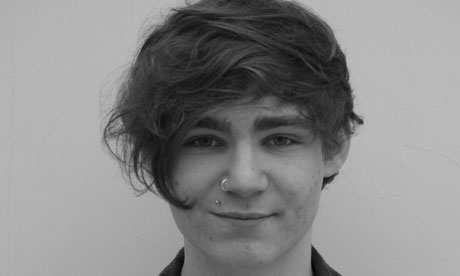
British mainstream culture offers some extreme images of adolescent life. In Channel 4's Skins, Bristol sixth formers throw massive parties, take loads of drugs, get drunk and have sex. Some are anorexic, pregnant or depressed – but, importantly, none have acne, bad haircuts or end up at the GUM clinic. Meanwhile, The Inbetweeners provides an antidote to this elegantly wasted vision of youth, as it follows a nerdy sixth former and his grubby mates in their (often gross) quest to get laid.
Ben Brooks's publishers are touting the 18-year-old's novel Grow Up as essential reading for fans of these TV shows. More grandiosely, they also declare that Brooks encapsulates "the voice of his generation". Such a boast cannot help but evoke the ghost of past narratives that loom large in the literary consciousness, in particular JD Salinger's The Catcher in the Rye and Bret Easton Ellis's Less Than Zero.
Brooks's novel has definite echoes of Skins, presenting adolescence as an idealised mixture of drugs and sex with some minor mental health issues thrown in. The narrator, Jasper, is 17 and contending with AS-levels at a "well-respected grammar school". His mother, a lawyer, has married a man called Keith, who Jasper suspects of murdering his ex-wife. When Jasper isn't fantasising about seducing his chaste classmate Georgia Treely, he spends his time writing a novel that features a rape scene and "getting mashed" on mephedrone or ketamine with his self-harming best friend Tenaya. Jasper and his "white middle-class" mates must also occasionally contend with vicious 14-year-olds from the local feral underclass.
Brooks aims to deal frankly with the teenage boy's biological urges. At his house party, Jasper sleeps with Abby Hall, a plump virgin who "believes in angels and does not drink". An evening spent snorting plant fertiliser results in Jasper having sex with an older woman whose "cheaply dyed hair" indicates that she "probably has kids". At another party, shortly after Jasper has "seduced" the virginal Georgia "in a slightly rapey way" by giving her drugs, he goes on to have sex in a bathtub with Tenaya. The problem is that Brooks never moves beyond a superficial recording of events, and this series of encounters, glibly described, cannot give any genuine insight into the adolescent experience.
The lack of characterisation makes for exasperating reading. The novel's adult characters are crude stereotypes. The religious studies teacher is a Christian nutcase who shrieks that her wayward class are "heathens". Jasper's therapist "looks like Susan Boyle" and responds to his apparent progress with "understated feminine applause".
Jasper's preoccupation with his stepfather might have provided an interesting dynamic. Brooks effectively conveys Jasper's perpetual scorn for this domestic interloper: "Keith is in the garden massaging the soil. He is probably imagining that the soil is the cleavage of a human cadaver." But Jasper's fixation with the stepfather's past is unconvincing; the macabre element is diminished by a self-conscious dollop of obscenity, striving to be shocking: "For Keith, murder is even better than anal sex."
Brooks's youth goes a long way to explaining the crassness of some of the writing: "Me and Tenaya go to her house. It is huge and Victorian, with ivy curling up the front like a paedophile's creepy fingers." While Brooks clearly harbours genuine comic ambition, Grow Up rarely manages much beyond cliche. Ultimately, the protagonist's assertion that "I am Holden Caulfield, only less reckless, and more attractive", however ironic and self-aware its intent, falls distinctly flat.

